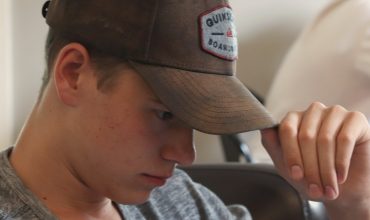In this post: how your teen can identify and manage a toxic friendship or other challenging relationships by setting boundaries.

My oldest can get along with most people, but as should be expected, from time to time he encounters a personality that is just not a fit for him.
On those occasions, I will usually explain the standard wisdom that we aren’t always going to like everyone and not everyone is going to like us, and then I encourage him to make the best of the situation.
I also remind him that we don’t always know what is going on with people behind the scenes. Maybe someone’s family is going through a challenging time or that person has a problem managing their own emotions.
While that isn’t an excuse for bad behavior, we should try our hardest to give others grace.
It usually ends with that conversation and I rarely hear much more about it.
However, there was a point recently when he had an ongoing struggle with another teenager. This boy had a consistently bad attitude and generally treated other kids poorly. His negativity poured through both in-person and online. He encouraged my son to keep secrets from me and his other close friends. Chaos seemed to follow him wherever he went, and he seemed to enjoy it.
From everything my son described, he was just a toxic personality.
How to identify a toxic person
A toxic person is anyone whose behavior routinely adds negativity and upset to your life. Often, people who are toxic are dealing with their own stresses and traumas, and/or dealing with a negative self-esteem.
But this doesn’t mean we have to let them into our lives and impact our own mental health.
Toxic people are usually manipulative, insincere, selfish, and often act like the victim.
A toxic person can often burst into your life by showering you with praise and suddenly needing you at every turn (which can cause you to feel like you’re helping them), but also treating you in an unkind or abusive way.
If your teen is a people-pleaser or someone with a big heart for others, it could be tough to spot the signs of a toxic friendship. Additionally, a toxic friendship could leave your teen feeling broken and confused. If you are seeing signs of depression or anxiety, you should seek out a therapist that can help them work through it.
Some red flags of toxic behavior include:
- There is always a lot of drama and stress when you are around them.
- They are controlling, excluding others from your relationship, and getting jealous when you spend time with anyone else.
- Passive-aggressive with their compliments and criticism (think Regina George from Mean Girls), as well as being defensive.
- They always change the subject back to theim.
- They are negative and think the worst about others (this can include a lot of gossip).
- They take more than they give.
- They may pressure you into doing things you don’t want to do.
- Blames others for their problems.

How to help your teen manage a toxic friendship
Once your teen recognizes a toxic person, it can be hard to know what to do next, particularly for a lonely adolescent who may feel desperate for companionship.
There is a way, however, to teach your teen to be kind and protect their hearts.
I was surprised when over the period of a few weeks, my son mentioned he was hanging out with this particular friend outside of school and that he even wanted him to come over to our home.
Not surprisingly, following each encounter, my son was sullen and didn’t look like he enjoyed himself. Each interaction seemed to be draining the life out of my teen.
There were criticisms about his room, the video games we had, and what we had to eat. He would show up an hour late and wouldn’t even offer an apology. He didn’t want my son to include any of his other friends when he came over.
My son looked like he was walking on eggshells in his own house.
By the fourth time, I finally pointed out to my teen son that he did not seem to particularly care for or enjoy being with this “friend.”
I knew I needed to be careful. My son is usually pretty socially savvy, so I was surprised that he was continuing this friendship. I also knew forbidding the relationship could have a reverse effect.
So I asked, “You seem not to enjoy your time with this friend. Why do you want to spend MORE time with this individual than you have to?”
His answer surprised me.
“I just think by spending time with him, maybe I could help, maybe I could CHANGE him.”
This was such a loving and earnest sentiment, but as a mother, I also found it as an opportunity to teach my son an important lesson about what constitutes a healthy relationship. I wanted to offer him a different perspective.
I did not want him to stick with a partner or toxic friend later on in his life because he thought, “If I just love them enough, I know I can fix them….”
I praised his heart for caring and wanting to help someone he thought of as a friend.
But then I explained it was important he understand that he isn’t responsible for fixing another human being. In fact, he wasn’t qualified.
Our compassion for others may lead us to want to save people from their own choices and behavior, but we don’t have that kind of power. It has to come from within.
I also explained that to be a good friend doesn’t mean that we have to put up with someone else’s bad behavior towards us.
Finally, I asked if he thought if the people he chooses as friends in the years ahead would play a role in shaping how his life turned out? “How is this person adding value to your life? How are you adding value to his?”
He humored me, stating that maybe his friend wasn’t really doing much to make him a better person.
Setting boundaries in a toxic friendship
Learning how to set and maintain boundares–especially regarding how to identify and manage toxic relationships–is an important part of growing up. Some teens may need help understanding what healthy friendships look like.
So, I encouraged my son to “help” this other teen by setting a good example during those instances they were required to be together.
However, I told him he had to be careful about allowing this boy, or any other person who just didn’t seem to be very positive in their choices or behaviors, to take up any more space in his life than necessary.
My son was able to successfully phase out this teen from his life without too much drama or confronting him head on. They still saw each other at school and at other social occasions with mutual friends, but he did not invite him for one-on-one social encounters anymore and simply said he wasn’t available for a few others.
On the one occasion when there was pushback, my son simply said, “We can hang out, but I don’t want to sit there and just complain about school and stuff.” And then his “friend” made other plans instead.
Boundaries are hard for everyone, especially teenagers.
Setting boundaries is a tough skill for me as an adult, so I could certainly appreciate how hard this may be for my teenager. Boundaries are uncomfortable because it forces you to advocate for yourself and your needs and could elicit an unpleasant reaction from the person on the receiving end.
But in today’s volatile world, teens need to be able to set boundaries to help avoid being manipulated, abused, or hurt. They allow us to protect our self-worth. They are the key to developing caring, encouraging, and respectful relationships.
For as much as we may have the best of intentions when we want to help another person change, we have to be aware that it is just as likely that the other person could end up changing us instead.
Parenting teens and tweens is hard, but you don’t have to do it alone. Here are a few popular posts that other parents thought were helpful.
Dear Teen, This Is What I Want You to Know About Friendship
Dear Teen Daughter, Learn to Love Yourself Not Be Liked by Others
Words Can Crush Our Teen Girls For A Lifetime, Here’s How To Help
Is It More Than Just Normal Teen Anxiety–When to Seek Medical Advice
When you are in the thick of raising teens and tweens, we recommend Loving Hard When They’re Hard to Love by Whitney Fleming. In Loving Hard When They’re Hard to Love, blogger Whitney Fleming shares her favorite essays about raising three teenagers in today’s chaotic world. Written from the perspective of a fellow parent, each story will leave you with tears in your eyes and hope in your heart because someone else is saying exactly what’s been going through your mind.







Wow! This is a good read. Iove the way you handled the situation without displacing your child from the throne. You still supported him remain seated on his throne, and eventually he figured out the changes he needed to make for his own safety.